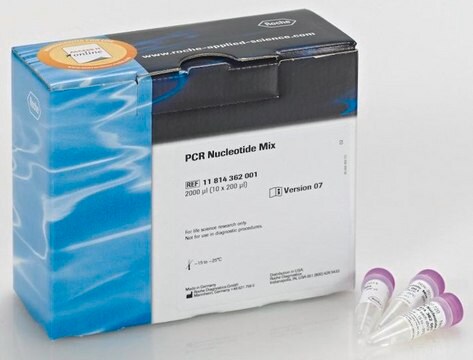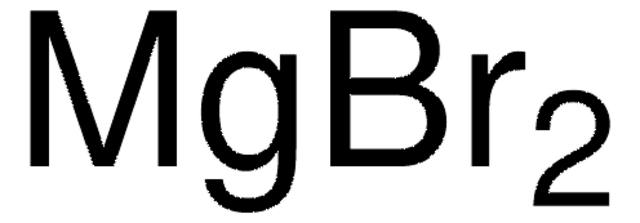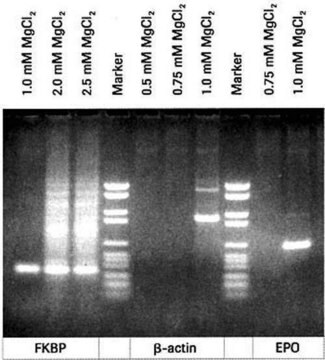449172
Magnesium chloride
AnhydroBeads™, −10 mesh, 99.99% trace metals basis
Synonym(s):
Magnogene
Sign Into View Organizational & Contract Pricing
All Photos(1)
About This Item
Linear Formula:
MgCl2
CAS Number:
Molecular Weight:
95.21
EC Number:
MDL number:
UNSPSC Code:
12352302
PubChem Substance ID:
NACRES:
NA.23
Recommended Products
product line
AnhydroBeads™
Quality Level
Assay
99.99% trace metals basis
impurities
≤150.0 ppm Trace Metal Analysis
particle size
−10 mesh
mp
714 °C (lit.)
density
2.32 g/mL at 25 °C (lit.)
SMILES string
Cl[Mg]Cl
InChI
1S/2ClH.Mg/h2*1H;/q;;+2/p-2
InChI key
TWRXJAOTZQYOKJ-UHFFFAOYSA-L
Looking for similar products? Visit Product Comparison Guide
General description
Magnesium chloride can be used as a starting material to prepare electrolyte solutions for Mg-polysulfide flow batteries.
Legal Information
AnhydroBeads is a trademark of Sigma-Aldrich Co. LLC
accessory
Product No.
Description
Pricing
Storage Class Code
13 - Non Combustible Solids
WGK
WGK 1
Flash Point(F)
Not applicable
Flash Point(C)
Not applicable
Personal Protective Equipment
dust mask type N95 (US), Eyeshields, Gloves
Choose from one of the most recent versions:
Already Own This Product?
Find documentation for the products that you have recently purchased in the Document Library.
Customers Also Viewed
Kadri Õunap et al.
PloS one, 10(7), e0133841-e0133841 (2015-07-28)
The human WBSCR22 protein is a 18S rRNA methyltransferase involved in pre-rRNA processing and ribosome 40S subunit biogenesis. Recent studies have shown that the protein function in ribosome synthesis is independent of its enzymatic activity. In this work, we have
Manal A Farg et al.
Human molecular genetics, 23(13), 3579-3595 (2014-02-20)
Intronic expansion of a hexanucleotide GGGGCC repeat in the chromosome 9 open reading frame 72 (C9ORF72) gene is the major cause of familial amyotrophic lateral sclerosis (ALS) and frontotemporal dementia. However, the cellular function of the C9ORF72 protein remains unknown.
Fernando Cartón-García et al.
Scientific reports, 5, 12312-12312 (2015-07-24)
Inherited MYO5B mutations have recently been associated with microvillus inclusion disease (MVID), an autosomal recessive syndrome characterized by intractable, life-threatening, watery diarrhea appearing shortly after birth. Characterization of the molecular mechanisms underlying this disease and development of novel therapeutic approaches
Takeshi Tomita et al.
PloS one, 9(9), e108957-e108957 (2014-10-01)
Celastramycin A, a small molecule that inhibits the production of antibacterial peptides in an ex vivo culture system of Drosophila, suppresses the TNFα-mediated induction of IL-8 in mammalian cells. To understand its molecular mechanism, we examined Celastramycin A binding proteins
Jennifer Hirst et al.
Human molecular genetics, 24(17), 4984-4996 (2015-06-19)
Adaptor proteins (AP 1-5) are heterotetrameric complexes that facilitate specialized cargo sorting in vesicular-mediated trafficking. Mutations in AP5Z1, encoding a subunit of the AP-5 complex, have been reported to cause hereditary spastic paraplegia (HSP), although their impact at the cellular
Protocols
Summary application report for analysis of moisture in Magnesium chloride
Our team of scientists has experience in all areas of research including Life Science, Material Science, Chemical Synthesis, Chromatography, Analytical and many others.
Contact Technical Service







